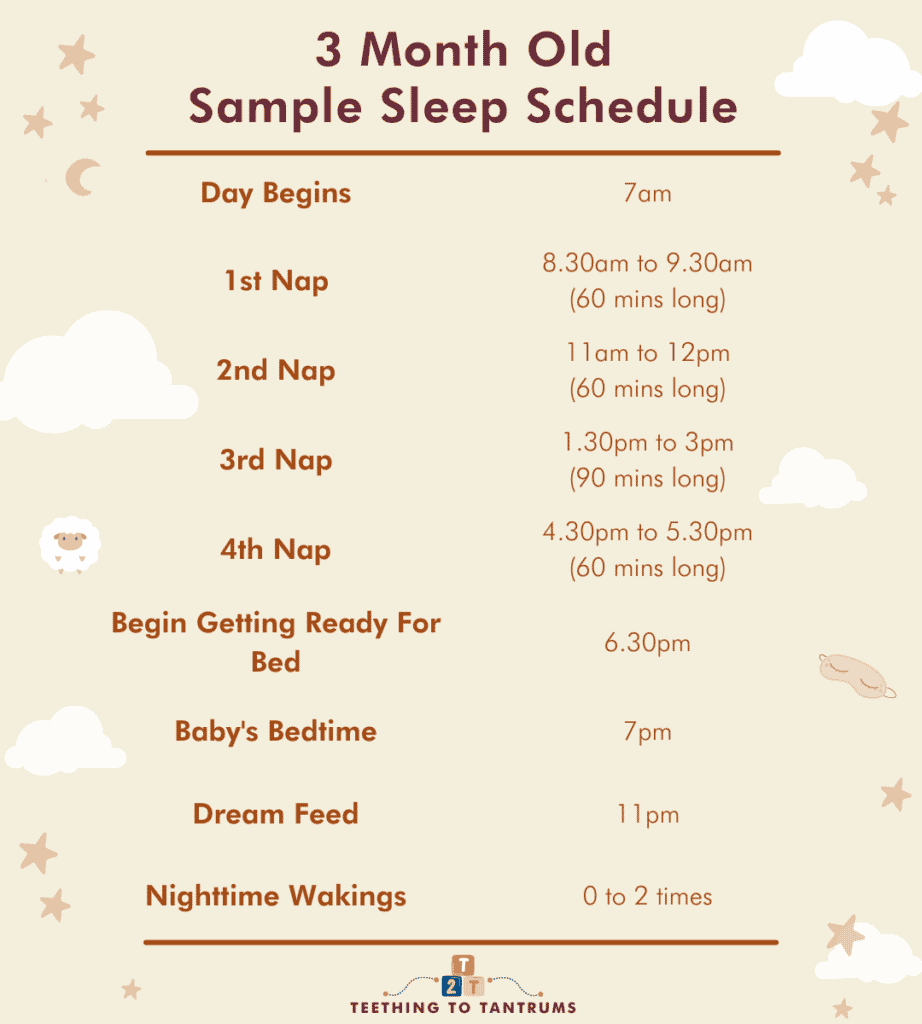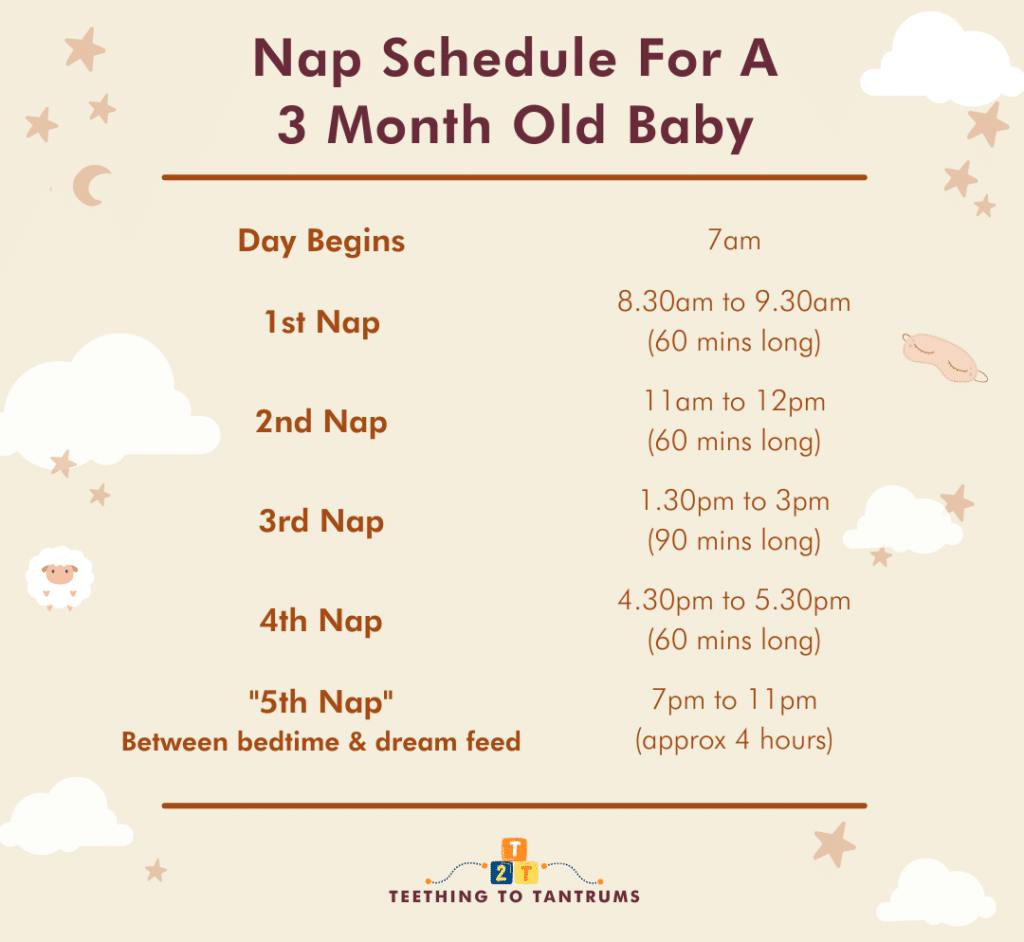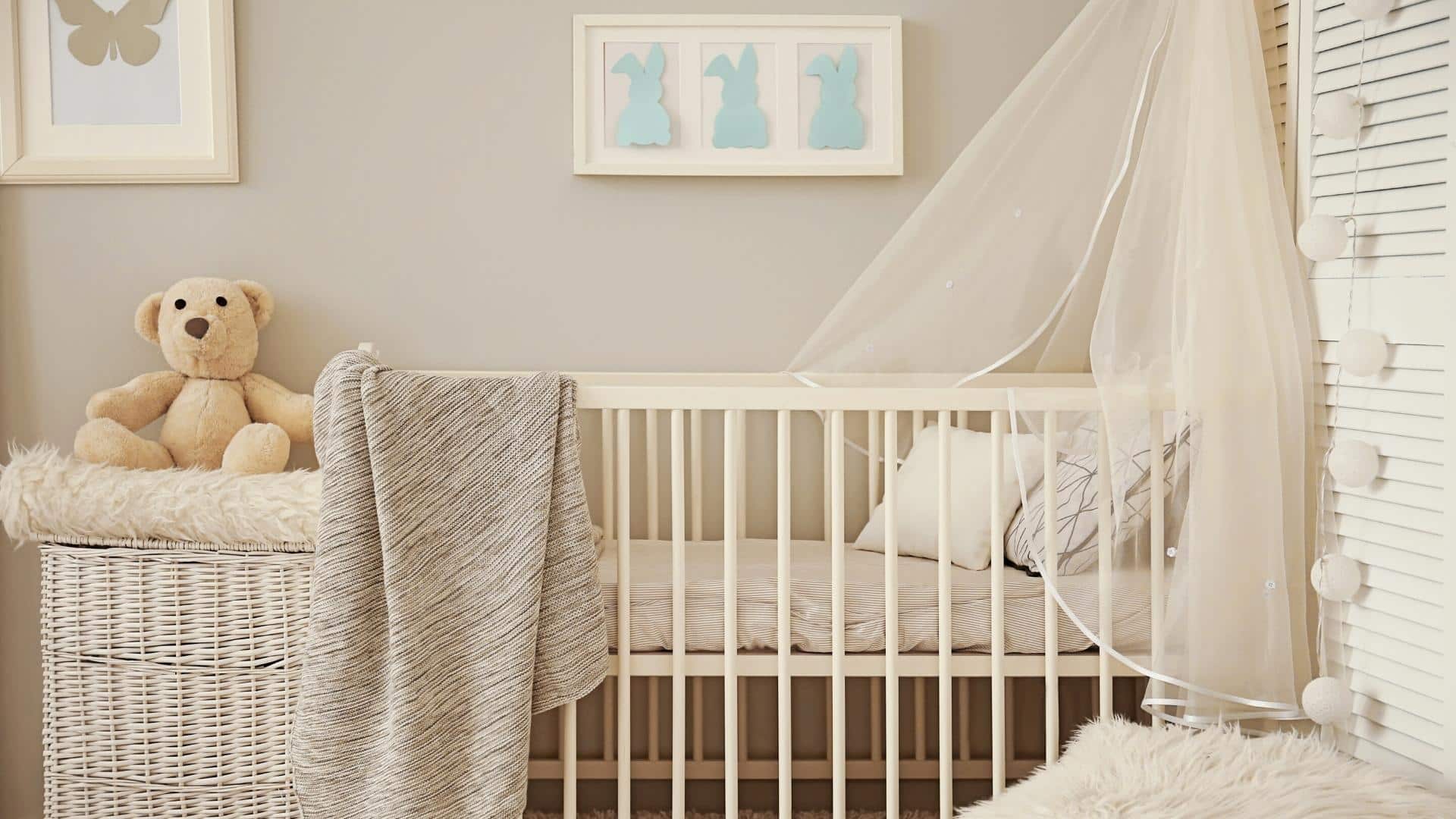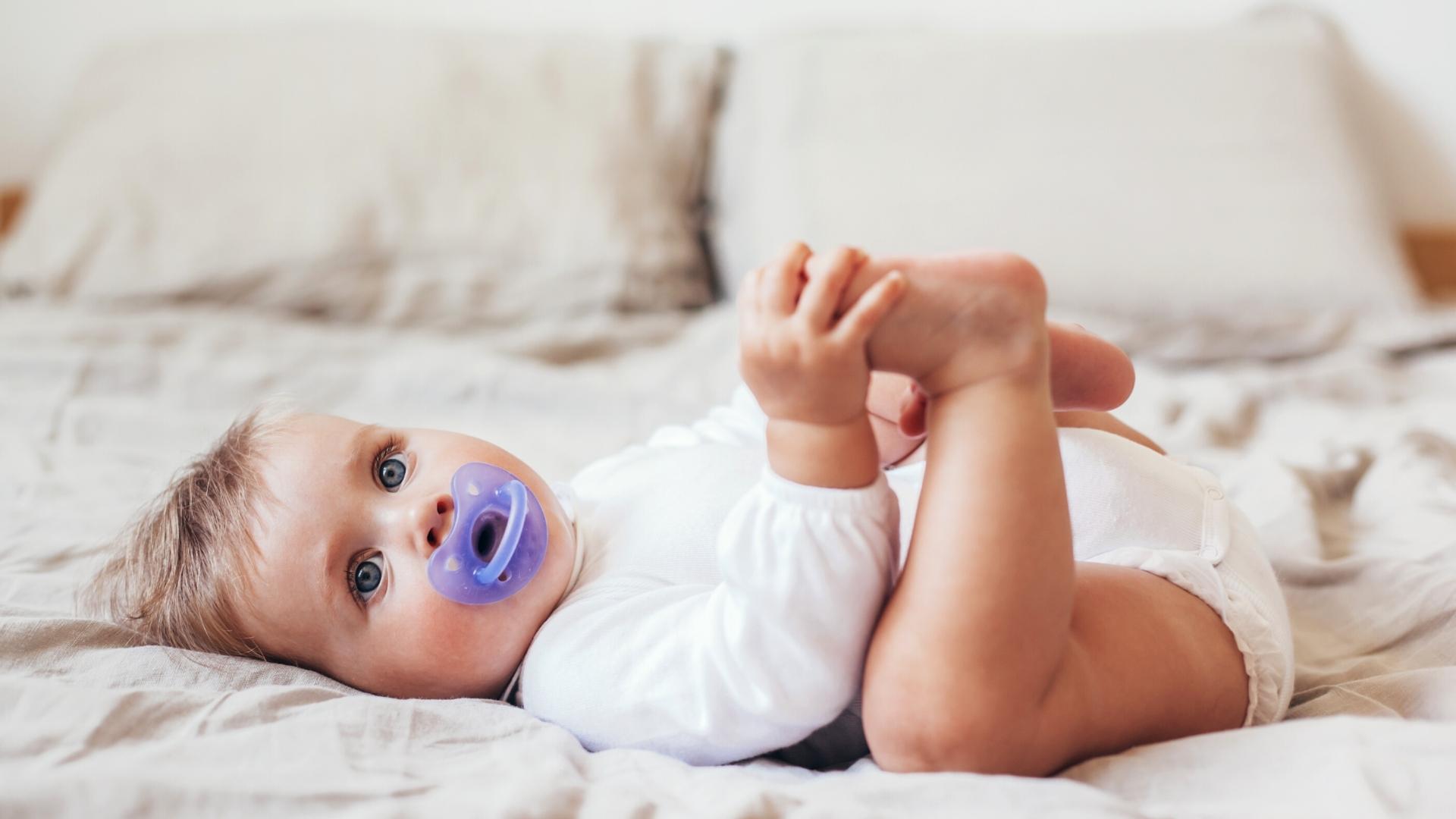Healthy sleep patterns start with a schedule. Here’s how and when to get your baby on a regular 3 month old sleep schedule with top tricks to make it as easy as possible.
How Much Should A 3 Month Old Sleep?
Most 3 month olds should have between 15-16 hours of sleep in a 24-hour period and they will be able to stay awake for 90 minutes at a time. Most will take 3-5 daytime naps lasting between 30 mins to 2 hours at a time too.
3 Month Old Wake Window
At 3 months, your baby will have 60 to 90 minutes of awake time between their naps.
This ensures that your baby has enough awake time during the day to meet their developmental milestones and to consume enough daytime calories to grow at a rapid rate.
TOP TIP: If your baby had a quick nap and is showing signs of being tired during their wake window (having only being awake for a short period of time…) then let them go to sleep again and DO NOT wait for ‘nap time‘. Trying to keep your baby awake will only lead to them getting overtired and being unable to settle.
Sample 3 Month Old Sleep Schedule
By 3 months old, you will hopefully begin to see a more regular sleep routine developing.
Here’s a sample 3 month old sleep schedule containing 4 daytime naps:
TOP TIP: A 3 month old sleep schedule should be built around baby’s individual needs and your lifestyle in order for it to be as beneficial as possible to form a healthy sleep foundation.

REMEMBER: At 3 months old, your baby’s routine may still vary from day to day and these are sample schedules for guidance only. Don’t worry if your baby isn’t following a predictable sleep schedule yet.
Nap Schedule For A 3 Month Old Baby
At 3 months, your baby is still very focused on growing and developing a whole host of new physical, emotional, cognitive and social skills through baby toys and play sessions… and as a result, they will still spend most of their time asleep.
Your 3 month old’s nap schedule will now follow a rough routine, however, it can still vary day to day.
Depending on how busy their day is, your baby will take daytime sleep split between 3 and 5 naps.
Here’s what a 3 month old nap schedule can look like:

How Long Should A 3 Month Old Baby Nap For?
This is a very common question and for your 3 month old baby, they will nap anywhere between 60 minutes and 90 minutes at a time.
Nap lengths vary greatly and at 3 months, baby may only nap for 30 minutes whilst others can sleep for 2 hours depending on their personalities and what has been going on in their lives.
Typically, a 3 month old will have 3 to 5 naps a day totalling 3 to 5 hours of sleep.
NOTE: The 5th nap of the day is more like a sleep window than a nap as it occurs between baby’s bedtime and their dream feed.
Bedtime For A 3 Month Old
At 3 months old your baby is definitely ready for a simple bedtime routine which should consist of:
- Having a bath,
- Followed by a massage,
- Getting dressed in a sleep sack or swaddle,
- Cosying up together with a suitable baby bedtime story and singing a lullaby,
- Having a nighttime feeding,
- And finally, putting baby to bed in a safe sleeping space on their back.
The whole bedtime routine should take no longer than 30 minutes and should be repeated at the same time every evening as a part of your 3 month old sleep schedule.
REMEMBER: The purpose of a bedtime routine is to calm your baby in the evening, so that their body can relax and be prepared to sleep. Certain activities have been proven to relax babies, and when done in the right order, it definitely sets your baby up for sleeping longer at night.
Looking to get your little one to sleep quickly and effortlessly? Check out my Bedtime and Nap Cheat Sheet and master the art of making daytime naps and bedtimes as seamless as possible.
A bedtime & nap cheat sheet so good your little one will ask you to put them to bed...
Laura Williams "This is a life saver! I'm so glad I downloaded your bedtime & nap cheat sheet. My little one actually asked me to put him to bed last night! Unbelievable! Thank you so much!"
Click Here For The FREE Cheat Sheet
What Time Should A 3 Month Old Go To Bed
A 3 month old should be going to bed by 7pm after their bedtime routine is complete.
If your baby is still waking for night feedings, I would recommend having a dream feed before you go to bed to maximise the amount of sleep you can have before having to feed them again.
And if your baby takes fewer naps per day (ie: 3-4), I would suggest having an earlier bedtime to ensure they still get enough sleep.
NOTE: Expect an average of 10-12 hours of nighttime sleep (including the 5th nap/sleep window) but remember, I don’t recommend letting your baby’s night last any longer than 12-12.5 hours.
3 Month Old Sleep Regression
Sleep regressions can hit at any time and are usually triggered by your baby’s changing daytime sleep needs.
The first sleep regression usually occurs at around 4 months of age but it can appear when your baby is 3 months old depending on how they are developing.
And as a result, if you have not done so already, now is the perfect time to start teaching your baby to self-settle by putting them in their crib to sleep when they are drowsy and not fast asleep as a part of your 3 month sleep schedule.
Whether your baby is experiencing a 3 month sleep regression with increased night waking and short naps or learning that they really like to have a feed and cuddle when they wake up in order to go back to sleep…
Teaching your baby to fall asleep independently will go a long way to forming healthy sleep habits and breaking unwanted waking habits in order to get you through the regression far quicker.
To learn more about the 3 month sleep regression and how to manage a baby who won’t sleep unless held, read the following posts:
- 3 Month Sleep Regression: The Ultimate Survival Guide
- Sleep Regression: What, Why, Signs & Sanity-Saving Solutions
- Baby Won’t Sleep Unless Held (12 Proven Steps To Follow)
3 Month Old Sleep Tips
Managing and creating a 3 month old sleep schedule can be a rollercoaster of emotions…
Some days you will find it very easy to get your baby to sleep on time and on other days, it will simply not happen.
The key for this age is to remain consistent.
The effort you put into your 3 month old sleep schedule now will pay off in the long run, I promise.
Here are my top tips to make creating and sticking to a 3 month old sleep schedule as simple as possible:
- Put your baby down when they are drowsy but not asleep. I know this is hard to do as we all love cuddling our babies… However, getting your baby used to falling asleep alone is essential to their development and doing this at a young age will be easier on them and you than if you leave it until they are older and the habit becomes so much harder to break.
- Place your baby to sleep in the same place when at home. Now that your baby is more aware of their surroundings they will become easily distracted during awake times. Putting your baby to sleep in the same sleep space for naps as well as nighttime sleep will give them strong sleep associations which will help them settle better.
- Optimise your 3 month old’s sleep environment. Ensuring your baby has the best sleep environment becomes more and more important as they grow. Keep the lighting dim and use a white noise machine. It is also important that some of the daytime naps are taken at home in their dedicated sleep space and not all on the go. Good quality sleep during the day will definitely help with nighttime sleep.
White noise machines are a game-changer for your little one's sleep and having one that plays all night is a must. With a long-lasting battery, this compact and stylish white noise machine contains 21 non-stop relaxing noises, which will lull your little one to sleep night after night, no matter where you are!
- Remember this motto: eat, play, sleep. Your baby will now become more interested in the world around them and will respond to things that you show them. They are able to ‘play’ simple games at this age whether it be looking at a mobile or doing tummy time under a baby gym, watching your face and responding to you talking and singing to them. Getting into an eat-play-sleep routine with your baby will lay the foundations for a healthy routine as they grow!
This play gym is designed by experts for baby's developing brain and body. Winner of multiple awards it includes everything you need in an activity gym-from batting to teething to learning to focus-for a whole year of play.
REMEMBER: Your baby does not need to be on a rigid 3 month old sleep schedule. Now is simply the time to introduce healthy sleep associations.
Common 3 Month Old Baby Sleep Problems
The most common sleep problems that your baby may encounter when establishing a 3 month old sleep schedule are:
- Your fussy baby struggles to fall asleep alone and whines for you when they wake up
- Your baby wants to feed a lot at night
- Baby is beginning to start teething and is not settling because they’re uncomfortable
- They experience nighttime fussing.
- They are sleeping for fewer hours at night because they’re sleeping too much during the day.
Frequently Asked Questions About 3 Month Old Sleep Schedules
Looking for more help with creating your baby’s 3 month old sleep schedule? Find answers to the most common questions here.
Can You Sleep Train A 3 Month Old Baby?
No, you cannot sleep train a 3 month old baby yet. At 3 months they are too young for formal sleep training…
However, having healthy and regular sleep routines will set your baby on the right path to good sleep habits and a consistent sleep cycle.
Watch this video to learn how to establish healthy sleep habits for years to come (to avoid sleep training altogether)!
How Do I Teach My 3 Month Old To Self-Settle?
While a baby of 3 months old is too young for sleep training you can start to help them to learn how to self-settle to sleep at night.
It is important that you do not let your little one get distressed and you will need to practise this skill very gradually.
- Start by trying to put your baby down to sleep before they are fast asleep.
- If they fuss then some gently rocking of the crib or putting your hand on their tummy to help to settle them.
- Try to avoid picking them up again unless they become really upset.
- Repeat.
This may not work every time but be patient and eventually, your baby will learn to fall asleep without you having to rock or hold them.
Watch this video to learn more about teaching your baby how to self-settle.
TOP TIP: Swaddling is still important at this age when teaching self-settling as it will help to make your little one feel safe and secure while sleeping. I love the HALO range of swaddles if you need a new set.
With soft, plush micro-fleece, this super soft swaddle wraps newborns in just the right amount of warmth. This sleep sack swaddle suits infants from birth to potentially 3 months, offering both comfort and safe sleep practices with its arm immobilization feature.
The innovative 3-way swaddling system adapts to a baby's sleep style, a crucial feature for those restless nights. Whether it's arms in, hands-to-face, or arms out, it grows with the baby's swaddling needs!
Meanwhile, the bottom zipper makes midnight diaper changes a breeze!
How Much Nighttime Sleep Is Appropriate For A 3 Month Old?
A 3 month old baby will sleep between 8-12 hours at night in their nighttime sleep space.
Many babies of this age will still wake up during that time for a couple of feeds but some may begin to sleep for 6 hours in one stretch.
How Long Should A 3 Month Old Stay Awake For?
The amount of time your 3 month old can stay awake will depend on the time of day and their personality.
Most babies of this age will be awake for about 90 mins before needing to go back to sleep.
TOP TIP: At 3 months of age your baby will be able to stay awake for longer periods of time but keep an eye on sleep cues to avoid overtiredness.
Can A 3 Month Old Baby Sleep Through The Night?
Yes, if you are lucky!
Depending on your little one’s development, a 3 month old baby is physically able to go for up to 8 hours without being fed.
That being said… many babies will still be waking for at least one nighttime feed after their dream feed (especially if they are breastfed).
In order to help your baby learn to sleep through the night, teach your baby to fall asleep without you and try to avoid rushing to their side when they wake up.
REMEMBER: All babies are different and this is never more true than in the early months when routines can be unpredictable. Try not to compare what your baby is doing with others.
Sleep Schedules Further Reading
Here are some more sleep schedules to help you get the most out of helping your little one sleep as best they can.
After all…
Sleep breeds sleep!
- Newborn Sleep Schedule
- 1 Month Old Sleep Schedule
- 2 Month Old Sleep Schedule
- 3 Month Old Sleep Schedule
- 4 Month Old Sleep Schedule
- 5 Month Old Sleep Schedule
- 6 Month Old Sleep Schedule
- 7 Month Old Sleep Schedule
- 8 Month Old Sleep Schedule
- 9 Month Old Sleep Schedule
- 10 Month Old Sleep Schedule
- 11 Month Old Sleep Schedule
- 12 Month Old Sleep Schedule
- 13 Month Old Sleep Schedule
- 14 Month Old Sleep Schedule
- 15 Month Old Sleep Schedule
- 16 Month Old Sleep Schedule
- 17 Month Old Sleep Schedule
- 18 Month Old Sleep Schedule
- 19 Month Old Sleep Schedule
- 20 Month Old Sleep Schedule
- 21 Month Old Sleep Schedule
- 22 Month Old Sleep Schedule
- 23 Month Old Sleep Schedule
- 2 Year Old Sleep Schedule
- 30 Month Old Sleep Schedule
- 3 Year Old Sleep Schedule
Need More Parenting Help?
- Download our FREE Bedtime & Nap Sleep Cheat Sheet. It’s a free, easy-to-use and proven formula designed for parents of 0-5 year olds to master the art of consistently undisturbed and restful sleep without the yelling, nagging or exhausting long-winded evenings.
- Check out our Parenting Toolbox. You’ll get access to expertly-chosen products that you can guarantee are the best for your little one and your wallet.
- Are you looking for personalized guidance to navigate the challenges of parenting? I offer 1-on-1 consultations to bring you tailored strategies and actionable advice to help support your child's growth and well-being with confidence.

A bedtime & nap cheat sheet so good your little one will ask you to put them to bed...
Laura Williams "This is a life saver! I'm so glad I downloaded your bedtime & nap cheat sheet. My little one actually asked me to put him to bed last night! Unbelievable! Thank you so much!"
Click Here For The FREE Cheat Sheet





